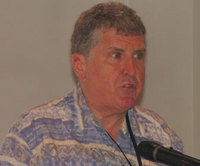‘Climate change is not just one environmental problem among a host of others’ – along with the massive extinction of species – it ‘is by far the most serious environmental issue facing humankind and the planet’. And ‘what is at stake are ultimately ethical and religious issues’.
 These are the words of visiting Irish Columban missionary, Sean McDonagh. Drawing on his recently published book Climate Change: the challenge to all of us, Sean presents with great clarity and passion, not just the facts about human-induced climate change, but also the challenge for each of us to be at the forefront of efforts to preserve life in all its diversity.
These are the words of visiting Irish Columban missionary, Sean McDonagh. Drawing on his recently published book Climate Change: the challenge to all of us, Sean presents with great clarity and passion, not just the facts about human-induced climate change, but also the challenge for each of us to be at the forefront of efforts to preserve life in all its diversity.
His underlying conviction is that the earth and the whole intricate web of life that exists on our planet is the flourishing of a 20 billion year cosmic journey. This journey is God’s creative process and today each of us is faced with a challenge to work with God to preserve and enhance the conditions so that all of life might continue to flourish.
Sean issues a substantial challenge to the church to provide much more effective leadership to address global warming. He is saddened by how little has been said by the Catholic Church about climate change and calls for a ‘wider ecological pastoral approach’ to ministry based on good science and an openness to the World Council of Churches and a variety of secular organisations who are competently reading the signs of the times.
But we also have a depth of resources of our own to draw on. As a religion with a strong incarnational sense, we have the seeds of a theology, a spirituality and a missiology that can reconnect us with God present in and through the natural world. Our rituals are key to this process but we need to move beyond the lens shaped by personal piety to see a more integral, holistic interconnecting with the rest of creation.
Sean also directs us to our social teaching. We have a depth of official writings on the common good, the preferential option for the poor and the call for us to stand in solidarity with the victims that while predominately focused on human beings, can and must be viewed through a wider ecological, pastoral lens that is rooted in the more inclusive story of the cosmos.
Sean speaks with passion because he has a deep sense of urgency. It is 20 years since his first book To Care for the Earth: a call to a new theology, but Sean continues to call us to choose between life or death, blessing or curse. It is ‘a time of unprecedented crisis for the natural world’ and therefore, for us who believe, it is a kairos moment. As individuals and as institutions, we must make concrete choices in favour of life – and not just human life and not just for today!
This is a prophetic call. It is prophetic because it demands a radical change in the way we view ourselves in relation to the rest of creation. It challenges us to rethink the concept of sustainability, the way we live and our responsibilities to those who are poorer, to other life forms and to the planet as a life entity.
Sean calls us to also be prophetic. We cannot but be touched and enthused by his passionate witness to life and our God of life. But he asks more that this! Sean calls us to be the change that is needed so that the planet might have fulness of life.
David Tutty runs the Auckland Catholic Justice and Peace Office.